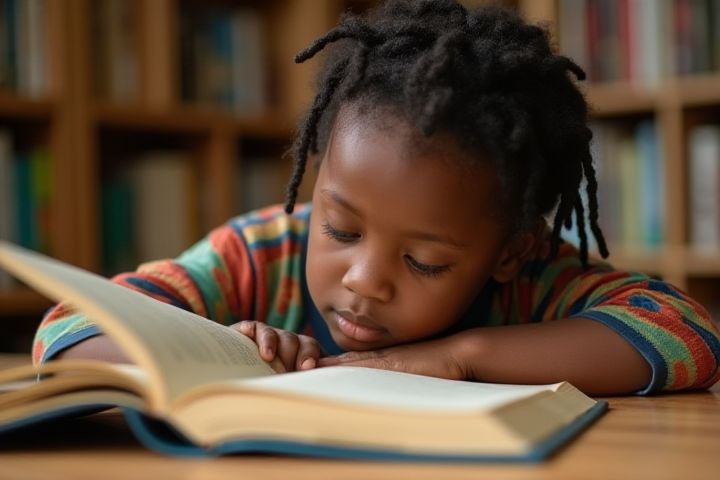
Nigerian children's literature is a vibrant and diverse field that reflects the rich cultural heritage of Nigeria. It includes traditional folktales, contemporary stories, and educational materials that engage young readers. Prominent authors such as Chimamanda Ngozi Adichie and Buchi Emecheta have contributed significantly to this genre by incorporating themes of identity, community, and resilience. Illustrated books often feature colorful artwork that captivates children while introducing them to Nigerian history and values. By exploring these literary works, you can instill a love for reading in the younger generation and promote an appreciation for African narratives.
Historical Context
Nigerian children's literature is deeply rooted in the country's rich historical context, often reflecting the diverse cultures, traditions, and experiences of its people. Stories often incorporate oral traditions, fables, and proverbs that convey moral lessons, connecting young readers to their heritage. Through characters and plots that portray significant events such as colonialism, independence, and socio-political changes, these works foster a sense of identity and cultural pride. Exploring these narratives allows you to appreciate the evolution of societal values and the role of storytelling in shaping the perspectives of future generations.
Cultural Representation
Nigerian children's literature offers a rich tapestry of cultural representation, showcasing diverse traditions, languages, and values from various ethnic groups in Nigeria. Through engaging narratives, authors create relatable characters that embody the struggles and triumphs of young Nigerians, fostering a sense of identity and belonging. This literature often incorporates folktales, proverbs, and local customs, providing young readers with insights into their heritage. By exploring themes of community, family, and resilience, Nigerian children's books not only entertain but also educate, nurturing a deeper understanding of cultural diversity and heritage among the youth.
Oral Tradition Influence
Nigerian children's literature is deeply rooted in the influence of oral tradition, showcasing vibrant storytelling techniques passed down through generations. Folktales, proverbs, and myths not only entertain young readers but also instill cultural values and moral lessons. Renowned authors, such as Cyprian Ekwensi and Buchi Emecheta, often weave traditional narratives into contemporary themes, creating a unique fusion of the past and present. As you explore this genre, you can appreciate how these stories preserve Nigeria's rich heritage while engaging young minds in critical thinking and creativity.
Language Diversity
Nigerian children's literature showcases rich language diversity, reflecting the nation's over 500 ethnic groups and over 700 languages. This literary realm often incorporates indigenous languages such as Yoruba, Igbo, and Hausa, allowing young readers to engage with cultural narratives that resonate with their identities. Stories frequently explore themes of tradition, family, and social values, providing invaluable insights into the varied customs and lifestyles across Nigeria. By immersing children in this linguistic variety, Nigerian literature not only fosters language preservation but also promotes empathy and understanding among the younger generation.
Themes of Identity
Nigerian children's literature often explores themes of identity, reflecting the diverse cultural tapestry of the nation. Books in this genre highlight local traditions, languages, and familial ties that shape personal and communal identities. Through engaging narratives and relatable characters, young readers encounter the significance of cultural heritage and self-discovery. This literary exploration fosters a sense of belonging while encouraging children to embrace their unique backgrounds and experiences.
Moral Lessons
Nigerian children's literature often emphasizes moral lessons, ensuring young readers grasp essential values. Stories are rich with themes such as honesty, respect, and the importance of community, reflecting the cultural heritage of Nigeria. Various authors introduce traditional folktales alongside modern narratives, fostering a sense of identity while teaching critical life skills. Through engaging characters and relatable situations, these literary works inspire children to internalize ethical principles that resonate in their daily lives.
Folklore and Mythology
Nigerian children's literature is rich in folklore and mythology, offering vibrant narratives that reflect the diverse cultures of the country. Through engaging stories, children learn about traditional values, moral lessons, and the importance of community, often featuring characters like tricksters, heroes, and mythical creatures. The incorporation of local languages and proverbs enhances the authenticity of these tales, fostering a connection to cultural heritage and identity. By exploring themes such as bravery, friendship, and the consequences of one's actions, these literary works play a crucial role in shaping young minds and preserving Nigeria's oral traditions.
Notable Authors
Nigerian children's literature boasts a rich tapestry of notable authors who have shaped the genre through their unique storytelling and cultural insights. Pioneering figures like Chinua Achebe and Buchi Emecheta have laid the groundwork for contemporary voices, while younger authors such as Sherri L. Smith and Simi Sunny make significant contributions to the narrative landscape. Through themes of identity, tradition, and resilience, these writers engage young readers, fostering a deeper understanding of Nigerian heritage. Your exploration of these influential authors can reveal the profound impact they have on nurturing a love of reading among children in Nigeria and beyond.
Global Recognition
Nigerian children's literature has gained significant global recognition, highlighting its vibrant storytelling and rich cultural heritage. Prominent authors like Adebayo Adeyemi and Chimamanda Ngozi Adichie have contributed to this literary landscape, crafting narratives that resonate with universal themes while reflecting Nigerian traditions. Publishers such as Cassava Republic Press play a pivotal role in bringing diverse voices to international audiences, showcasing stories that captivate young readers across the globe. By addressing themes of identity, resilience, and social justice, Nigerian children's literature not only entertains but also educates young minds, fostering a deeper understanding of cultural diversity.
Educational Impact
Nigerian children's literature plays a crucial role in shaping educational outcomes by providing culturally relevant narratives that resonate with young readers. Through engaging stories, it fosters a sense of identity and belonging, introducing children to diverse cultural perspectives and moral lessons. The incorporation of local languages and folklore enhances literacy skills while promoting the preservation of indigenous knowledge. By addressing themes such as resilience, friendship, and societal values, these literary works not only entertain but also empower youth in their educational journeys.
